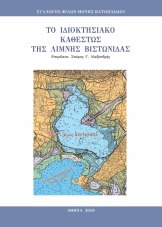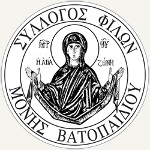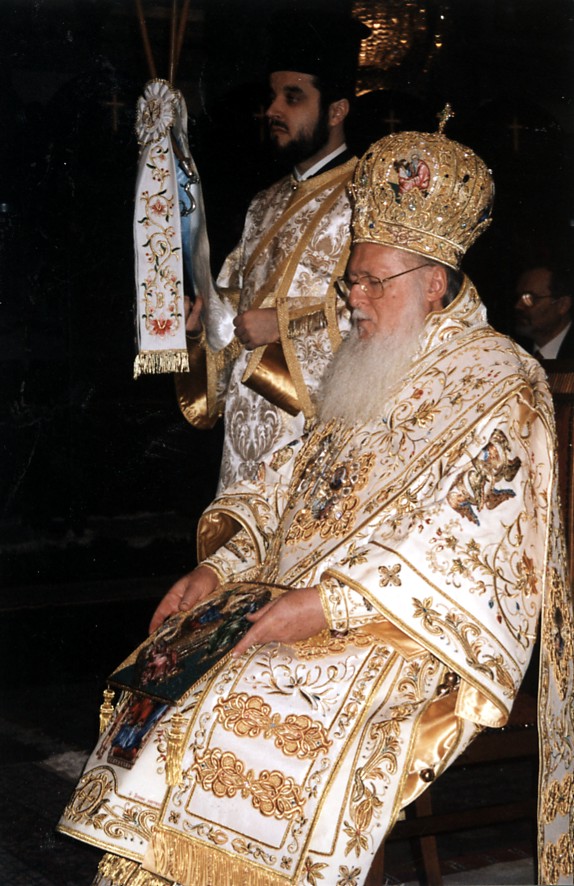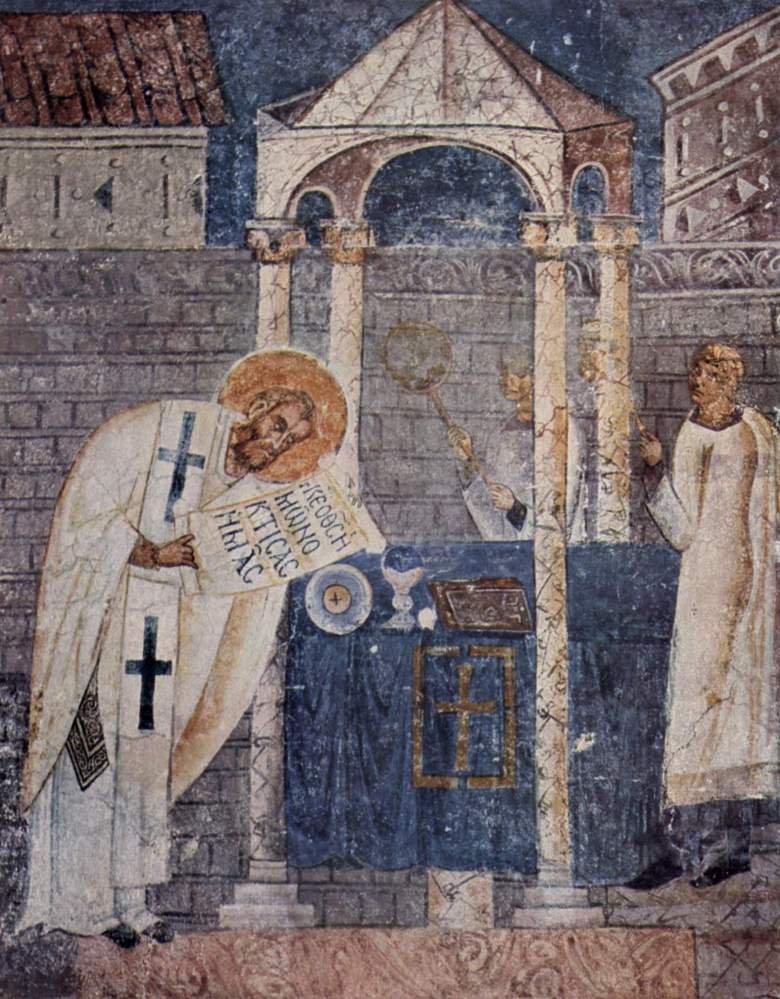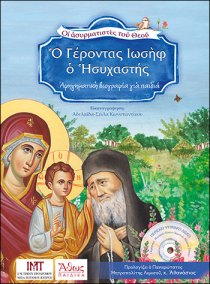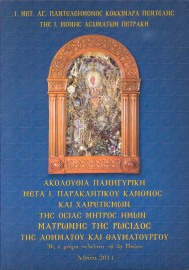The άνάλαβος (Analab[v]os), which is the distinctive garment of a monk or a nun Tonsured into the highest grade of Orthodox monasticism, the Great Schema, is adorned with the instruments of the Passion of Christ. It takes its name from the Greek αναλαμβάνω («to take up»), serving as a constant reminder to the one who wears it that he or she must «take up his cross daily» (St. Luke 9:23). The ornately-plaited Crosses that cover the Analabos. the Polystavrion (πολυσταύριον, from πολύς, «many,» and σταυρός, «Cross»)—a name often, though less accurately, also applied to the Analabos—reminds the monastic that he or she is «crucified with Christ» (Galatians 2:20):
Hesychia – «Watchful, Inner Stillness in Prayer»
30 Απριλίου, 2010 — vatopaidifriend3The monks of the Holy Mountain teach us that through ascetic practices we are able to perfect quietude of body and mind and to arrive at a vision of the Uncreated Light of the Godhead. The use of our prayer rope together with the Jesus prayer «Lord Jesus Christ, Son of God, have mercy on me a sinner» is a means to achieve peace and sorrowful joy within the Christian Life. Διαβάστε τη συνέχεια του άρθρου »
Monasticism: The Angelic Evangelic Life
20 Απριλίου, 2010 — vatopaidifriend3Almighty God has gifted Orthodox Christianity with monasticism. It is the “alternative lifestyle” of Orthodoxy to which some, but not all, are called. Many sources state that the monastic life is the angelic life. Going one step further, some sources even state that God has replaced the angelic ranks that fell with Satan with the men and women who have been called to the angelic (that is, monastic) life.
When we think of monasticism, several images and ideas come to mind – such as monasteries, the prayer life, and asceticism. But what about evangelism? Does the angelic life have a connection with the evangelical life that we Orthodox Christians are supposed to be living daily (especially those of us in the “front lines” – in our parishes and in the secular world)?
The Elder Joseph the Hesychast (+1959) Strugles, Experiences, Teachings (21)
9 Νοεμβρίου, 2009 — vatopaidifriend35. The Differences between the Trials
Trials (peirasmoi) are so called because they engender experience (peira), since in the unseen war they do indeed afford spiritual knowledge to those who are attentive. Anything is called a trial if it is in opposition to our struggle for faith and true piety while we are pressing on towards submission to God, but they are subdivided into various kinds, according to the understanding of the Fathers. There are the trials of those taking part in the struggle, so that they may make additional gains and progress in their struggle. There are the trials of the slothful and unwilling, to make them beware of things that are harmful and dangerous. There are the trials of those who are drowsy or sleeping, in order to wake them up. Then again there are the trials of those who have distanced themselves and gone astray, to make them draw near to God. Different again are the trials of the righteous and friends of God, so that they may inherit the promise. There are also trials of the perfect, which God permits in order to bring them forward in the Church for the strengthening of the faithful and as an example to be emulated. There is also another kind of trial, again of the perfect, such as those endured by our Lord and the Apostles, who fulfilled the law of communion with the world by taking up the trials which are ours.
The Elder Joseph the Hesychast (+1959) Strugles, Experiences, Teachings (20)
3 Νοεμβρίου, 2009 — vatopaidifriend34. On Trials and the Spiritual Law
The Fathers’ saying ‘spill your blood and receive the spirit’ could be described as the ever-memorable Elder’s permanent motto. Intrepid and courageous as he was, he left no room for queries or doubts in his life. But his ardent faith also contributed to this excellent combination, and so the results were always positive. Resolve and daring are the chief characteristics of man’s freedom which manifest his will, and with faith in God – which is all that is asked of our rational nature – they arouse and bring down upon us the divine energy which heals what is infirm and completes what is wanting.
The Elder Joseph the Hesychast (+1959) Strugles, Experiences, Teachings (19)
26 Οκτωβρίου, 2009 — vatopaidifriend33. On Regime and Disorder
Among the duties which the ever-memorable Elder taught us during the first days of our life under him was that of good order and keeping to a regime, while he described disorder to us in the blackest of colours. He often quoted to us the saying of St Ephrem the Syrian, ‘Those who have no guidance fall like leaves’ – which signifies, as he told us, the lack of any regime. He was also in the habit of referring to various incidents in the lives of more recent Elders and particularly of the Elder Theophylact from the hermitage of St Artemios, who was renowned for his virtue and spiritual gifts.
The Elder Joseph the Hesychast (+1959) Strugles, Experiences, Teachings (18)
25 Οκτωβρίου, 2009 — vatopaidifriend32. On Discovering the Will of God
Our life with the Elder had the character of childhood rather than a mature state. Our effort, in basic terms, was directed towards the monastic tradition, and we exerted ourselves as forcibly as possible in the obligations of our rule. What we lacked, essentially, was the discernment of an experience in discrimination so as to evaluate the situation, so that the spiritual scope of the Elder did not elude us in its depth and breadth and height. But is it perhaps usual and inevitable for disciples to discover their teacher ‘when he is taken from them’? (cf. Lk 24:31). Untiringly, the Elder made a constant effort to pass on to us everything that is spiritual and he did not fail in his aim, because ‘the wise man has his eyes in his head’ (Eccl. 2:14). It is true, however, that ‘for everything there is a season, and a time for every matter’ (Eccl. 3:1).
At a mature age, when the Elder was no longer with us, we understood the depth of his words and his actions even down to the details, whereas while he lived they seemed, to our inexperience, riddles that made no sense. We put all our meagre powers into our effort to be obedient and not to grieve the Elder. But we had virtually no comprehension of the meaning and main aim of the spiritual law which the Elder passed on to us with such fervour. I will not go into biographical details again, but I want to comment a little on the aforementioned subject of the spiritual law, which is what chiefly governs human beings.
We observed that the Elder never embarked on anything without first praying. We would ask him about something in the future or for the next day, and his reply was that he would tell us tomorrow. The object was so that he could pray first.
Our desire focussed on knowledge of the divine will: how should one recognise the divine will? He would say, ‘Are you asking about this, boys, when it is the most basic thing?’ We would encourage him with increased curiosity, ‘But, Elder, isn’t God’s will known in general terms through the Scriptures and the whole of divine revelation? Since everything in our life is regulated – what other question should we monks have?’ And the Elder replied, ‘May God give you “understanding in everything” (2 Tim. 2:7). St Nilus the Calabrian prayed that he might be granted “to think and speak according to
the divine will.”
The Elder Joseph the Hesychast (+1959) Strugles, Experiences, Teachings (17)
24 Οκτωβρίου, 2009 — vatopaidifriend3Part Two: Teaching
1. On Sanctification and Dispassion
We have already said how difficult it is to describe spiritual figures. We repeat this once again, adding that it is a very bold undertaking to try to enter into the depths and breadth of illumined minds and spirit-bearing beings. But this attempt becomes even harder when the person undertaking it is ignorant and inadequate to the task. We have therefore ‘cast our anxiety upon the Lord’ (1 Peter 5:7) in order that ‘in the riches of His kindness’ (Rom. 2:4) He may make known to the hearts of our readers ‘what is the breadth and depth and height’ (Eph. 3:18) of the spiritual realm into which ‘all who are led by the Spirit of God’ (Rom. 8:14) enter and and in which they move, becoming and remaining sons of God. ‘For to all who received Him… He gave power to become children of God’ (Jn 1:12).
The Elder Joseph the Hesychast (+1959) Strugles, Experiences, Teachings (16)
23 Οκτωβρίου, 2009 — vatopaidifriend3It would be an omission not to speak of the other basic characteristic of our ever-memorable Elder, the great love and sympathy he had for his neighbour. In particular he loved the poor and those in trouble, and even more those who were suffering in soul, and for this reason they never stopped visiting us.
His last days were very painful, because his advanced heart condition interfered with his breathing and he got very tired. For us, however, this was a lesson and an opportunity to practice patient endurance. We were aware of his struggle, and while we tried to give him some relief, he would console us in appropriate ways with practical examples, speaking especially of the vanity of the world. He told us, ‘The day for me to leave is getting near. The way I am now, I’m not good for anything, and I can’t struggle any more either.’ The ever-memorable Elder did not in the least forget his aim; and with various contrivances, at every pretext life provided he found a means to struggle and bring forth fruit. Being unable to move or to lie down because of his illness, he sat in a makeshift armchair – a folding one – and wept constantly for the vanity of life. He awaited his release from this life as the greatest happiness that could befall him and murmured troparia for the departed, when he was not having too much difficulty breathing. ‘Arsenios,’ he said jokingly, ‘When are we leaving? You’re not praying, it seems, and we’re delayed.’ For almost forty days, his last days, he ate nothing: he just received Communion every day and took a little water-melon.
The Elder Joseph the Hesychast (+1959) Strugles, Experiences, Teachings (15)
22 Οκτωβρίου, 2009 — vatopaidifriend311. The move to New Skete
‘Arsenios,’ said the Elder one day in June 1951, ‘it looks as if our stay here is over. The boys have fallen ill. Who’s going to look after who now – they us, or we them?’ It was true: even I had begun to weaken, although I was a country boy and somewhat used to a hard life. I had a constant pain in my chest, I was coughing up blood and having stomach haemorrhages and I felt almost permanently unwell. My younger brother Ephrem was weaker, and in consequence he too joined the list of those ‘on suspension’.
The Elder then called us and told us his opinion and his decision that we should move somewhere lower down and nearer the sea, as the needs of our life required. But the foremost reason, as I have already explained, was economy towards us. That made me wonder at his discretion, that he preferred to sacrifice his personal peace in order to make allowance for our weakness, whereas he was by temperament very hard on himself.
The Elder Joseph the Hesychast (+1959) Strugles, Experiences, Teachings (14)
21 Οκτωβρίου, 2009 — vatopaidifriend3The Elder very often stressed the importance of vigil as the most practical method in the spiritual life, essential in all three states in the struggle. When the monk is starting out, at the first stage, which is the period of purification, all the systems of what is called practical work are used. At that stage, when the beginner is struggling with bodily afflictions, the most beneficial factor in subduing the passions and suppressing the actual commission of sin is keeping vigil. This applies particularly to unnatural movements, which are often intensified by the vigour of the body which is naturally overabundant in strong people. No other method of struggle helps as much as deprivation of sleep. Truly, vigil dissolves the body, as the ever-memorable Elder used to say.
The Elder Joseph the Hesychast (+1959) Strugles, Experiences, Teachings (13)
20 Οκτωβρίου, 2009 — vatopaidifriend3Perhaps I am now making myself incomprehensible or exaggerating, in the view of those who do not know this language. But it would be an omission if we were to conceal the full truth in order to please people at large, and so downplay the reality of how men of God think and act. The Elder knew the inner state of each one of us, and explained to us in detail how and why each thing happened to us, whether it was thoughts or the operation of passions or even the operation of grace; and also the way to be cured and free ourselves of things that happened to us. He was full of the grace and illumination of God, and gave richly from the abundance of his heart, without contrivance or effort or specialised qualifications but out of the treasure of his life experience, and in a way that was simple and convincing. He offered this to each individually according to what was preoccupying him; and when some of his advice and teachings exceeded the disciple’s capacity to receive them, he would supplement them with his prayer. The ever-memorable Elder also had the invariable practice never to undertake anything without praying and receiving guidance, and this was why we did not receive an answer immediately when we asked him about something we had a mind to do.
St. John of Rila – October 19
19 Οκτωβρίου, 2009 — vatopaidifriend3 Venerable St. John of Rila, a great spirit-filled ascetic struggler of the Bulgarian Orthodox Church, is the heavenly patron of the Bulgarian People.
Venerable St. John of Rila, a great spirit-filled ascetic struggler of the Bulgarian Orthodox Church, is the heavenly patron of the Bulgarian People.
He was born in the year 876 in the village of Skrino in Sardica Province (which today is Sofia). Orphaned at an early age, the boy hired himself out to strangers as a shepherd. It happened that a rich man beat him because a cow and its calf had gotten lost. For a long time, the little boy wept and prayed that God help him. At the time he located the cow and the calf, the water level of the Sturma River had risen sharply. The young shepherd prayed, made the sign of the cross over his outer clothing, laid it on the surface of the water, picked up the calf and carried it across, as if on dry land, to the other shore, where the cow was waiting for them. The rich man, who had been hiding in the woods, was terrified upon witnessing this miracle; giving the boy a generous reward, he released him from service.
The boy gave away his fortune, and went off to his native village. When and where he received monastic tonsure is unknown. Διαβάστε τη συνέχεια του άρθρου »
The Elder Joseph the Hesychast (+1959) Strugles, Experiences, Teachings (12)
19 Οκτωβρίου, 2009 — vatopaidifriend310. From St Basil to Little St Anna
‘The solitaries lead a blessed life, for divine love gives them wings.’
Once someone’s heart is struck by the darts of this love, then nothing, no pretext or reason, can bind him or hold him captive. ‘Let’s go, Arsenios, let’s go! We have lost too much of our freedom from care and our stillness. Let’s go somewhere else to carry on our struggle, where we are not known, so that people can’t easily find us and deprive us of what we then lose, and they can’t even see!’
From information from older fathers of St Anna, they found out about some caves over by Little St Anna. These were below the hermitage of the ever-memorable Father Savas, the spiritual father, towards the sea; some Russian monks had lived there at one time, and two small cisterns were still preserved. When they had investigated the place and found that it really was a suitable and quiet place, isolated and hidden from the mass of people, they took up their poor clothes and a few books and settled themselves there. That was winter time, January 1938.
The Elder Joseph the Hesychast (+1959) Strugles, Experiences, Teachings (11)
17 Οκτωβρίου, 2009 — vatopaidifriend3Although they stayed in their hut more than before, they did go out from time to time in the summer to various places of stillness, and would carry on their struggle in the peaceful environment they had chosen, which was suited for such a purpose. On one occasion they went to the kathisma of St Gregory Palamas above the Great Lavra, where there is a little church, and there is a tradition that at one time the saint stayed there to find stillness, when he was in the region of the Lavra. It was late afternoon when they went, and they intended to stay a week or so, because the Elder felt very much at ease in that place. In the evening, when they had rested and begun their vigil praying alone, as they always did, the demons began causing a disturbance and then shouting, ‘You’ve burnt us, you’ve burnt us! Go away, go away from here!’, and they cursed in a crude and wicked manner. This time Father Arsenios heard them too, and was frightened. He ran to the Elder and asked him, ‘Why are they shouting like that, Elder? Who are they?’ The Elder reassured him and told him, ‘They are temptations.
The Elder Joseph the Hesychast (+1959) Strugles, Experiences, Teachings (10)
16 Οκτωβρίου, 2009 — vatopaidifriend39. Various Trials and Manifest Aid from our Lady the Mother of God
The Apostle Paul informs the fullness of the Church about his trials and his affliction, which were so extensive the he ‘despaired of life itself’ (2 Cor. 1:8). He stresses that he was ‘utterly crushed beyond his strength’; and corresponding to this we have the patristic interpretation and practice which describes how terrible and numerous are the trials which lurk in the way of those who wish to be saved. Of course, there are also other passages in Scripture which deal with the same subject, and it may be said that the chief prerequisite for salvation is endurance of many trials. But it is the Apostle Paul in particular who reveals to us the mystery and the meaning of tribulations – the chief of the Apostles, the giant of the Church, the exact image of Christ. If he, Paul, who constantly urges us to imitate him (1 Cor. 11:1), and who quite simply carried out all that has been commanded us (Lk 17:10), according to our Lord’s word – if Paul expresses himself in this way, saying that the tribulations that are for salvation and perfection can push one to despair even of life itself, then one can understand the furnace that our Fathers passed through, those who in ancient times and more recently have held to the same path (cf. Phil. 3:16).
